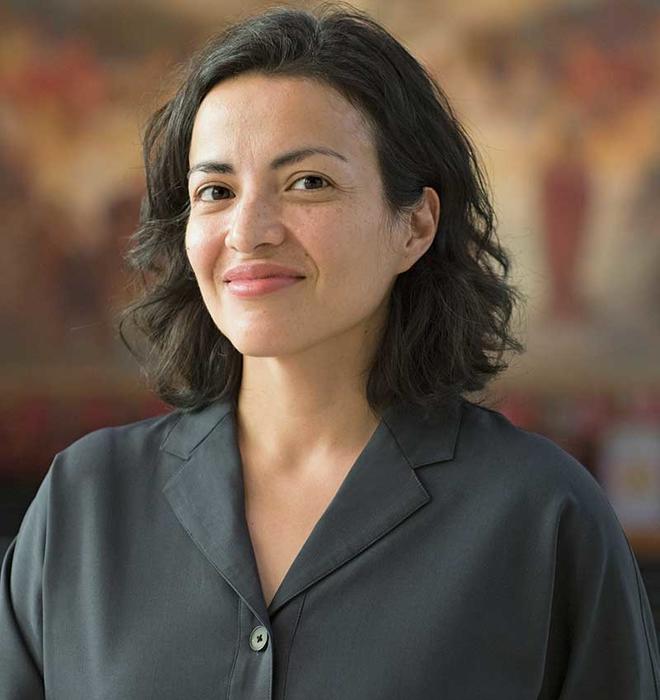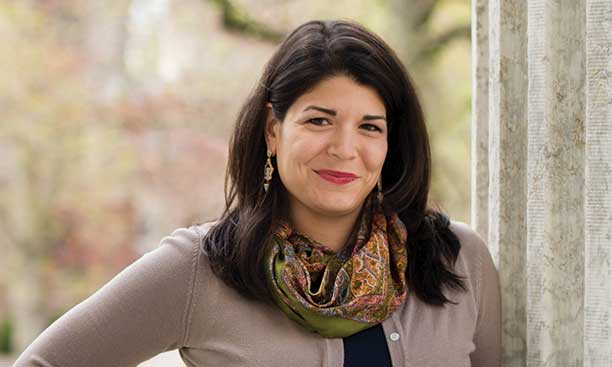
Jennifer M. Morton ’02 came to Princeton from Lima, Peru, a first-generation college student raised largely by her maternal grandmother after her mother immigrated to London in search of opportunity. That might sound like a background that would lead her to struggle on an Ivy League campus — and at times, she did. But Morton’s history also helped her succeed.
Like her mother and grandmother, who had left her home in the Andes to find a better life in Lima, Morton expected to seek opportunities elsewhere — in her case, Princeton. “Before embarking on that journey, however, I had already had my eyes opened by this immigrant narrative to the potential costs (and gains) of this path,” she writes in her new book, Moving Up Without Losing Your Way: The Ethical Costs of Upward Mobility (Princeton University Press). “When I got to college, my family, like that of many first-generation college students, couldn’t help me figure out what to look for in an advisor, what classes to sign up for, or how to become a part of the campus community. But luckily, they had prepared me to be an immigrant — that is, to feel lonely, distant, and out of place.”
As she explained to a gathering of more than 50 students and professors at Swarthmore College, outside Philadelphia, in October: “I had a very ready narrative: This is a different country, they do things differently here. ... I knew that I would miss home, and I also knew that there would be trade-offs involved.”
Many first-generation college students, she says, do not understand those trade-offs or the sacrifices that may be required along the way. Morton, an associate professor of philosophy at the City College of New York and the Graduate Center, CUNY, wrote Moving Up to illuminate those trade-offs — which she calls “ethical costs” — for both university administrators and the students themselves.
Morton describes low-income and first-generation students who view college as a means to transform themselves and their life circumstances as “strivers.” Addressing them in her book, she writes: “You’ve heard from family and friends that college is your ticket to a more comfortable life, but you have seen few people in your life succeed in that path. You are excited to go to college, but figuring out how to make it through and how to pay for it is daunting.”
The potential costs of upward mobility are not just monetary, Morton says: They include relationships with family and friends, connection to community, and a sense of identity. Struggling to fit in at elite institutions such as Princeton, strivers may feel isolated and disoriented, while also becoming increasingly estranged from their home communities. “The traditional narrative of upward mobility in this country acknowledges the academic and financial hurdles that strivers have to overcome to succeed,” she writes, “but it does not do a good job of preparing students for the emotional, psychological, and ethical challenges they will confront. We rarely tell students that their success may come at the expense of some of the things that they hold most dear ... .”
Aspects of students’ personal identity, from their mode of speech to their values, may come under stress, Morton says. Strivers often need to “codeswitch,” adjusting their behavior to different settings. But this strategy, she suggests, invites its own problems, including feelings of inauthenticity. “The ethical challenge,” she writes, “lies in striking a balance between resisting the pressure to adopt the dominant cultural norms when those conflict with our values and being flexible enough to adapt and thrive in that culture.” It’s not just students who are challenged, Morton says. Family and friends, while proud of the striver’s achievements, may experience distance and disconnection.
Morton encourages strivers not to become “complicit” in an unequal socioeconomic system after they have achieved a position of power. In the workplace, she suggests, successful strivers could use their power to provide the flexibility their employees need to care for children or parents at home; in hiring, they might look beyond job candidates with elite degrees. “An ethical narrative,” she writes, “should help the striver think not only about the challenges and sacrifices that will have to be made on the path of upward mobility, but also about the potential impact he or she can have at various points along that path.”
At Princeton, Khristina F. Gonzalez, associate dean of the College and director of programs for access and inclusion, says Morton has contributed a conceptual framework to understand problems the University has been grappling with. With both financial burdens and ethical conflicts, first-generation and low-income students “are really running two marathons at the same time,” Gonzalez says.
Among Princeton’s support programs is the Freshman Scholars Institute (FSI), an eight-week pre-orientation program for about 80 first-generation and low-income students. The Scholars Institute Fellows Program, launched in 2015 to expand FSI, provides a four-year “mentorship community” for students who identify as first generation or low income. It includes group meetings with trained upper-class mentors, workshops introducing students to academic opportunities, and counselor-led discussions on ethical and psychological issues. Programming for families includes an orientation, newsletters, and social-media outreach.
“We recognize that there may be a gap between the [students’] home communities and what Princeton is like,” Gonzalez says. “It’s not about assimilation. It’s about transforming the institution and using all the opportunities and resources and education that Princeton gives you to make good on the values that you already hold.”
Morton’s own path to Princeton and to an academic career was by no means assured. She was born to a Peruvian single mother and a Uruguayan father she never knew. The first of her three stepfathers, an American businessman, helped secure her admission to a private school, where she says she received a first-rate education amid the terror campaign of the Shining Path guerrillas. After Morton’s mother and aunt immigrated to London in the 1980s, her grandmother encouraged her to leave Peru. “You’re not going to be able to find a better life here,” she told Morton. Her aunt’s marriage to a wealthy man helped fund her education, Morton says.
Morton says she had “a pretty good experience overall” at Princeton, though she felt like an outsider and sometimes avoided academic risks. Rather than ask for help in an advanced math class, where she struggled to understand the material, she dropped the course. “I regret that I gave up so quickly,” she says. “I didn’t want to fail.”
She earned a doctorate in philosophy at Stanford, then took a job as a visiting assistant professor at Swarthmore, where she was struck by the talent and polish of the many students from privileged backgrounds. “I realized that my [Swarthmore] students would be fine, no matter what,” she says. Experiencing “a crisis of faith” about her vocation, she began reading in the sociology of education.
Her next job was at City College of New York, or CCNY, where her classes included undocumented immigrants, housewives returning to school, and men and women who pursued full-time jobs along with their studies. The contrast with Swarthmore could not have been starker. Morton felt she could have a greater impact at CCNY, where, she says, so many students were torn between family demands and academic requirements. When they missed class or assignments, she came to realize, “in most cases, there was some rather complicated story” involving obligations outside of school. Offering the usual advice, about putting themselves first, didn’t seem adequate. “That’s when I came up with the idea of the ethical costs,” she says.
Next month, Morton — who is married to Jason Anderson *05, an architect, and has a 2-year-old daughter — starts a new job as an associate professor at the University of North Carolina at Chapel Hill. “It was a hard decision,” she says, precipitated in part by deteriorating working conditions at CCNY. One of her UNC courses will be an interdisciplinary class targeted at first-generation students. Pairing philosophy and memoir, it is titled “Self: Aspiration and Transformation.”
Freelance journalist Julia M. Klein is a cultural reporter and critic in Philadelphia.
READ MORE:
Gabriela’s StoryAn excerpt from Moving Up Without Losing Your Way







2 Responses
Mary Bjorkholm s'61 p'89 p'91
6 Years AgoGood Reading
I enjoy most of the articles. In particular, it's convenient to be able to access them on my cellphone -- not only my computer.
Go Tigers.
Norman Ravitch *62
6 Years AgoA Sad Outcome
I knew someone who left a professorial position at a first-class school for one at a tenth-class school. But he ended up committing suicide.